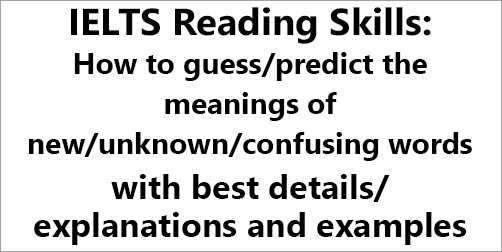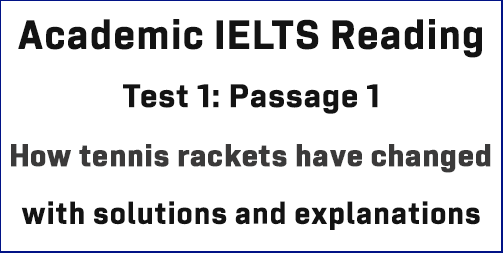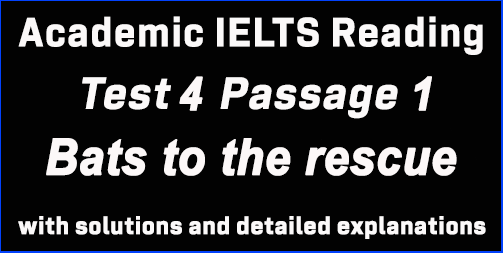IELTS Reading Skills: How to guess/predict the meaning of new/unknown/confusing words; with best details/explanations and examples
This post on IELTS Reading Skills focuses on some methods to guess/predict the meaning of new/unknown/confusing words. Hopefully, reading this post will guide beginners in IELTS Reading easily to understand how to guess the meaning of such words in a real-test situation.
When you don’t understand a new/unknown/confusing word in a large text, what’s the first thing you do? Most probably you stop reading the text; then you search for a good dictionary and try to find out the meaning. When you are satisfied with the meaning, you come back to read the text. Now, the black magic happens with a lot of people like it always happened with me! You suddenly find that you’ve lost your interest in reading. Taking the ‘Dictionary break’ sometimes costs your attention and you fail to get into the reading again.
Well, how about a different approach to Reading an article? When you start reading a text, you will surely face some new/unknown/confusing words you don’t have idea about. You might be a native speaker of English and still you will face the same problem. Taking help from a dictionary can be a solution but you can’t use a dictionary in an exam situation, can you? Therefore, you need some strategies that may help you predict the meaning of the word. Here, is this lesson, I’ll try to show you some strategies that can help you guess the meaning of such words.
Let’s begin.
1. You don’t need to know every new/unknown word. Sometimes they aren’t needed.

Ask yourself this question: Do I need to know all the words? Let’s take the following sentence as an example:
“By asking people about their experiences of boredom, Thomas Goetz and his team at the University of Konstanz in Germany have recently identified five distinct types: indifferent, calibrating, searching, reactant and apathetic.” (Cambridge IELTS 13 Test 1 Reading Test 2)
Here, in this long sentence, most average English learners have the possibility to get stuck with these 3 words, calibrating, reactant and apathetic. Should you stop reading for that?
OK, let’s try to guess what these words mean in general, not the exact meaning. Do these words belong to a same group? The previous lines talk about boredom and their types. All these three words are the types of boredom. The other two words are known to you, indifferent and searching. Probably, in the next few paragraphs, there will be some sort of discussion on each type. So, for now, you don’t need the exact meaning. Have you got my point? A long list of games may have peculiar names of games like Molkky which you don’t need to know; a game is a game, isn’t it?
2. Parts of speech can help to find out the meaning:

It’s easy to find a meaning, not exact but close at least, if you know what part of speech it belongs to. Most often candidates and students of IELTS test get jammed to an unknown word without considering much about the part of speech. In most cases the new words are nouns, adjectives, verbs or adverbs. If you know the functions of these parts of speech, it becomes easier to guess a meaning.
Let’s look at this example sentence:
“Fish were a vital commodity in growing towns and cities, where food supplies were a constant concern. . ..”. (Cambridge IELTS Series 8 Reading Test 2)
Let’s suppose you don’t know the word commodity in this text. Let’s try to guess it from it’s part of speech. What kind of part of speech is it?
The sentence says, “Fish were a vital commodity . .. .” The preceding words are ‘a’ and ‘vital’. ‘a’ is an article and ‘vital’ is an adjective. Therefore, to maintain grammatical rule, the next word has to be a noun (article + adjective + noun). As the word commodity is a noun, we can guess the meaning as a thing or person (a noun is always a thing or a person). Now, the sentence tells us that it is about fish and fish cannot be a person. So, we can guess that the meaning of commodity should be something. So, we can read the sentence like this: “Fish were a vital something. .. . ..”
3. Root words can direct you to the meaning:

This is another easy way to find the meaning of a confusing/unknown word. Take this example:
“… . . Extreme high performance sports may lead to optimal cardiovascular performance, but they quite certainly do not prolong life . . .” (Cambridge IELTS Series 8 Reading Test 3)
As the word is before the word ‘performance (noun)’, we already know that this new word cardiovascular is an adjective. So, can we guess the root word for this particular word? Let’s dissect the word first:
- cardiovascular = cardio + vascular
So, the root word here is cardio which means heart-related. You may even know other words like cardiology, cardiac, cardiogram, cardiologist, cardiograph; all these word relate to something or someone dealing with heart (body part).
Now, if you read the sentence again, you can guess the meaning better.
“… . . Extreme high performance sports may lead to optimal cardiovascular (or heart) performance, but they quite certainly do not prolong life . . .”
It does the work quite well, doesn’t it?
4. Break down the sentence. You may learn the meaning of the word from the whole sentence.

When you find a very long sentence with some unknown words, don’t panic. You can break down the sentence which may help you find the meaning of the unknown word(s). Let’s have a close look at the following example:
“… At various points in evolutionary history; enterprising individuals within many different animal groups moved out onto the land, sometimes even to the most parched deserts, taking their own private seawater with them in blood and cellular fluids.” (Cambridge IELTS Series 9 Reading Test 1)
Suppose, you don’t know the meaning of the word ‘parched’. Let’s take a deep breath and break down the sentence. Can you see two commas separating the sentence in three individual parts?
Part 1: At various points in evolutionary history; enterprising individuals within many different animal groups moved out onto the land,
Part 2: sometimes even to the most parched deserts,
Part 3: taking their own private seawater with them in blood and cellular fluids.
Now, think about the second part only, forget the first and third part for the time-being.
“. . .. . sometimes even to the most parched deserts,. .. ..”
So, here we can see that the text is taking about deserts which are parched. Again, just like in method no. 2, desert is a noun, so, the word ‘parched’ is an adjective. Therefore, this word describes a quality or status of deserts. We know that the most significant status or quality of a desert is that it is a dry place. So, the word ‘parched’ must be something related to ‘dry’.
Now, you can check your dictionary at a later time and find out whether you were correct in guessing the meaning or not. If not correct, you will be close, trust me.
5. Search for clues around: it can be synonyms, antonyms, prefixes, suffixes, anything.

Let’s take a look at the following sentence:
“Hearing impairment or other auditory function deficit in young children can have a major impact on their development of speech and communication, resulting in a detrimental effect on their ability to learn at school.” (Cambridge IELTS Series 9 Reading Test 2)
Suppose, you don’t know these words: auditory and deficit. Let’s look for other words here, may be some synonyms or antonyms.
First, let’s dissect the word auditory to find out the root word:
The root word for auditory is audio. Does the root word ring any bell? Take a look the first word of the whole sentence. Hearing is synonymous to audio. Thus, the word auditory relates to sound.
Now, let’s have a look at the second word, deficit.
Take a look at the first part of the sentence again:
“Hearing impairment or other auditory function deficit in young children . .. .”
Can you see the word ‘or’ here? What’s the function of the word ‘or’ here?
According to Cambridge Dictionary, the word or is a conjunction that connects two or more possibilities or alternatives. It connects words, phrases and clauses which are the same grammatical type.
So, we can say that ‘or’ connects two synonymous words.
The phrase ‘Hearing impairment’ has an adjective (hearing) and then a noun (impairment). Here, impairment means a problem.
Now, let’s have a look at the phrase after ‘or’. The phrase is ‘auditory function deficit’. Here, ‘Hearing’ means ‘auditory function’. So, in this text deficit means impairment.
6. Definitions or explanations might help too.

If you know how to find out the definition of a word, you are in luck! No unknown or new words can obstruct your reading of the text.
You can look for different words such as is, mean(s), depict(s), describe(s), refer(s) to, known as, called, named, entitled, deal(s) with, explain(s), suggest(s), comprise(s), consist(s) of etc.
You should also look for asterisk sign (*) or numbers (1, 2, etc.), a hyphen or double hyphen (-, – -), even brackets ( ) with a word too. If you find them, look below or around the text. There should be some sort of footnotes or glossary explaining the word(s).
Let’s have a look at some examples:
“As their name suggests, stepwells comprise a series of stone steps descending from ground level to the water source . . ..” (Cambridge IELTS Series 10 Reading Test 1)
Here, the words suggests and comprise give us the definition of stepwells.
Another example:
“Easter Island, or Rapa Nui as it is known locally, is home to several hundred ancient human statues – the moai.” (Cambridge 11 Test 2 Reading Passage 2)
Suppose here, in this sentence, you don’t understand the words Rapa Nui and the moai. Now, take a close look at the phrase Rapa Nui, you’ll see a definition of the word given just after that; “. . . .is home to several hundred ancient human statues – the moai.”
Again, the explanation or definition of the phrase the moai is given in the same sentence. Have a look at the sentence again and you will see a hyphen before the phrase the moai. This means an explanation is given just before the hyphen which is “.. .. ancient human statues”.
Here is one more instance:
Take a look at this image of the text taken from Cambridge IELTS Series 10. In paragraph B, you’ll find a word – photosynthesis with an asterisk sign (*). This means the word is explained just below the text. I’ve marked it with a red line.

One final example for your better understanding:
“Silk is a fine, smooth material produced from the cocoons – soft protective shells – that are made by mulberry silkworms (insect larvae).” (Cambridge IELTS Series 11 Test 3 Reading Passage 1)
Suppose, these two word seem confusing to you; cocoons and silkworms. Actually, both the words are explained here. The word ‘cocoons’ is explained within two hyphens “– soft protective shells –“ and the word silkworms is explained within brackets “(insect larvae)”.
So, looking for an explanation or definition around can help you directly.
7. Think about nuance/ connotations of a word: what’s the implied positive or negative?

This technique will be useful for candidates who are already in a good place in Reading or Writing Test and now want to target 8.0 or 9.0.
Connotation refers to the implied meaning of a word. It can be positive or negative. Confused ? Let’s take a look at some examples:
- “Alex’s thesis paper looked a bit different in that it constructively criticized the government plan to reduce the number of basic shelters for the homeless.”
- “Hannah’s dissertation seemed to be different from her classmates’ as it did not follow the basic structure or any writing plan.”
As you can see, both sentences A and B contain the word different. Then why have I used green in A and red in B?
In sentence A the word different implies that Alex’s writing was unique.
In sentence B the word different implies that Hannah’s writing was peculiar.
This is known as connotation. If you can understand connotation in IELTS, you have a great chance to score way better than others. However, it needs a huge amount of practice.
That’s all from me for this post. I hope you now have a better understanding to think about new/unknown/confusing words. If you are already in a good position in Reading, this post may/might help you to get a better score, but if you are seriously in troubles with your Reading test because of unknown words, try these ideas while you do a test of your own and keep the dictionary away from you for a while. I bet you’ll find these ideas useful and effective.
If you still have queries or want to know more about this lesson, hit the messenger button and throw your questions there or mail me at ieltsdeal@gmail.com. I’ll be in touch, I promise.
Click here to learn about IELTS Reading skills: Skimming and Scanning




One thought on “IELTS Reading Skills: How to guess/predict the meaning of new/unknown/confusing words; with best details/explanations and examples”